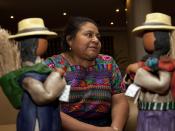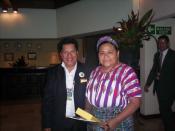In her autobiography, Rigoberta Menchú narrates the story of the indigenous people of Guatemala whose lives during the twentieth century reaction era were marked by hardship and injustice. "I, Rigoberta Menchú" illustrates the clashing of civilizations in the New World as a direct result of the colonizers' stubborn attempt to introduce and impose their culture into a medium that was not entirely compatible with it. The world view of the indigenous people of Guatemala was limited to their humble agrarian society, therefore, their appreciation for life, nature, religion and work differed greatly from that of the ladinos and this created strains in their relationship; strains that would ultimately find means of expression in protest and reaction. The ladinos' conception of the Guatemalans also contributed to this clash, the inaccurate stereotypes and blind discrimination resulted in the ladinos' disregard for the peasants' uniqueness and individuality. A lifetime of tradition cannot change overnight.
Perhaps if the conquerors had introduced their culture to the New World in a more subtle way the wounds of the clash of civilizations would have been minor bruises instead and easier to heal.
While the epitome of beauty for the ladinos was civilization and modernization, the epitome of beauty to the indigenous people of Guatemala was family, tradition, work and nature. The city, with its towering buildings and speeding cars, was overwhelmingly intimidating to the Indians. Rigoberta describes the city as being a "(...) monster, something alien, different." (Menchú, 32) Instead, the peasants were exposed to the natural environment and were content: "Where I live is practically a paradise, the country is so beautiful. There are no big roads, and no cars." (Menchú, 2) Rigoberta's community respected nature because they depended on it for subsistence. The ladinos considered this worship as pagan and introduced Catholicism as an alternative...


